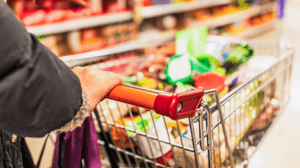Metro Group: At the Future Store, Seeing Is Believing
Without a doubt, one of the most talked about technology projects in the retailing world in the past year has been the Future Store, an Extra supermarket opened last April in Rheinberg, Germany, by German retailing giant Metro Group.
March 1, 2004
MICHAEL GARRY
Without a doubt, one of the most talked about technology projects in the retailing world in the past year has been the Future Store, an Extra supermarket opened last April in Rheinberg, Germany, by German retailing giant Metro Group.
Metro Group, based in Dusseldorf, Germany, wanted to bring together in a live retail setting some of the most interesting and potentially useful technologies supporting in-store operations. These include an intelligent scale, personal shopping assistant, a variety of kiosks, electronic shelf labels, electronic displays, employee PDAs, self-scanning and applications of RFID (radio frequency identification). The goal was to see how these systems would work individually and together, and how consumers would react to them. What better way to evaluate whether they should be applied chainwide?
To create the Future Store, Metro Group realized it couldn't act alone. So it assembled a remarkable collection of more than 40 technology and CPG companies in what is called the Future Store Initiative; all involved have a stake in the success of the project. (See www.future-store.org.) The companies have contributed technology and marketing resources to the initiative in return for access to the results.
Since the Future Store opened on April 28, 2003, with much fanfare and supermodel (and Rheinberg native) Claudia Schiffer in attendance, the buzz surrounding this single supermarket has been palpable. It reached a fever pitch in January as Metro Group demonstrated the Future Store in a 13,000-square-foot exhibit at the National Retail Federation's annual conference in New York.
At the conference, Metro Group's chief executive officer, Dr. Hans-Joachim Korber, and its chief information officer, Zygmunt Mierdorf, also unveiled the company's plans to have its top suppliers begin RFID tagging of pallets and cases this year, following in Wal-Mart's footsteps.
For taking the retailing world by storm with a technology initiative of unprecedented ambition and scope, and for beginning to realize the fruits of that initiative, Metro Group is SN's choice for the 2004 Technology Excellence Award in the international category.
The point man for the Future Store is Dr. Gerd Wolfram, project manager, Metro Future Store, who has worked in IT for Metro Group since 1990. Dr. Wolfram will be speaking about the Future Store at a workshop today at the Marketechnics show in San Francisco. Wolfram explained to SN that the idea for the Future Store followed the completion of a standardization of IT systems across Metro Group's retail divisions, which began in 1996 with the formation of Metro AG, the management holding company that oversees all of the divisions and was completed in 2002. A single service division, MGI (Metro Group Information Technology), now handles IT for the entire company.
In addition to the 476 Extra supermarkets in Germany, Metro's other divisions include 456 Metro Cash & Carry wholesale outlets; 285 Real hypermarkets; over 130 Galeria Kaufhof department stores; 341 Praktiker home improvement outlets; and over 230 Media Markt and Saturn consumer electronics stores. Metro Group operates in 28 countries.
After the consolidation, Metro Group saw the Future Store as an opportunity to start planning for future investments in technology. From a practical aspect, the company realized that a store serving as an integrated "test bed" for new technologies would be a more effective way of evaluating systems than testing "point solutions" in isolation from one another, said Wolfram.
While acknowledging the risk of conducting tests in a functioning store, he said, "We now see it was the best thing to do because you can get direct feedback from customers. In a lab, it's not a real situation." Metro executives can get a better idea of whether an application should be rolled out to other stores and divisions, he noted. "Seeing is believing, I always say," stated Wolfram.
In addition, Metro Group wanted to demonstrate to young people interested in technology that the company could be an attractive place to work. "If you ask students where they want to work after graduating, they'll say Daimler or Lufthansa," he explained. "Retailing is seen as conservative. We're trying to change that by developing leadership in technology."
Nearing its one-year anniversary, the Future Store is considered a success so far, Wolfram said, based on positive feedback from shoppers — though many are still getting used to the technology — as well as the learning Metro has derived from the project. In addition to its RFID announcement, Metro will roll out NCR self-checkout lanes tested at the Future Store to 50 Extra and Real stores this year (among the first such installations in Germany), and will begin replacing outdated produce scales with the intelligent scale, which recognizes produce and prints out a bar code.
Metro has made a point of being open about the Future Store with other retailers. Major chains from around the world, including Wal-Mart, Tesco and Carrefour, have been given guided tours. "It's better to talk with them and get feedback than for them to go though the store hidden," observed Wolfram. "This is first about Metro, but we also want to get others to do similar things so there's more innovation in retail in general."
About the Author
You May Also Like






